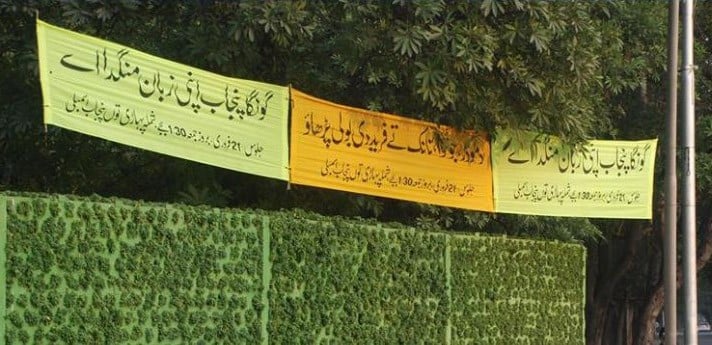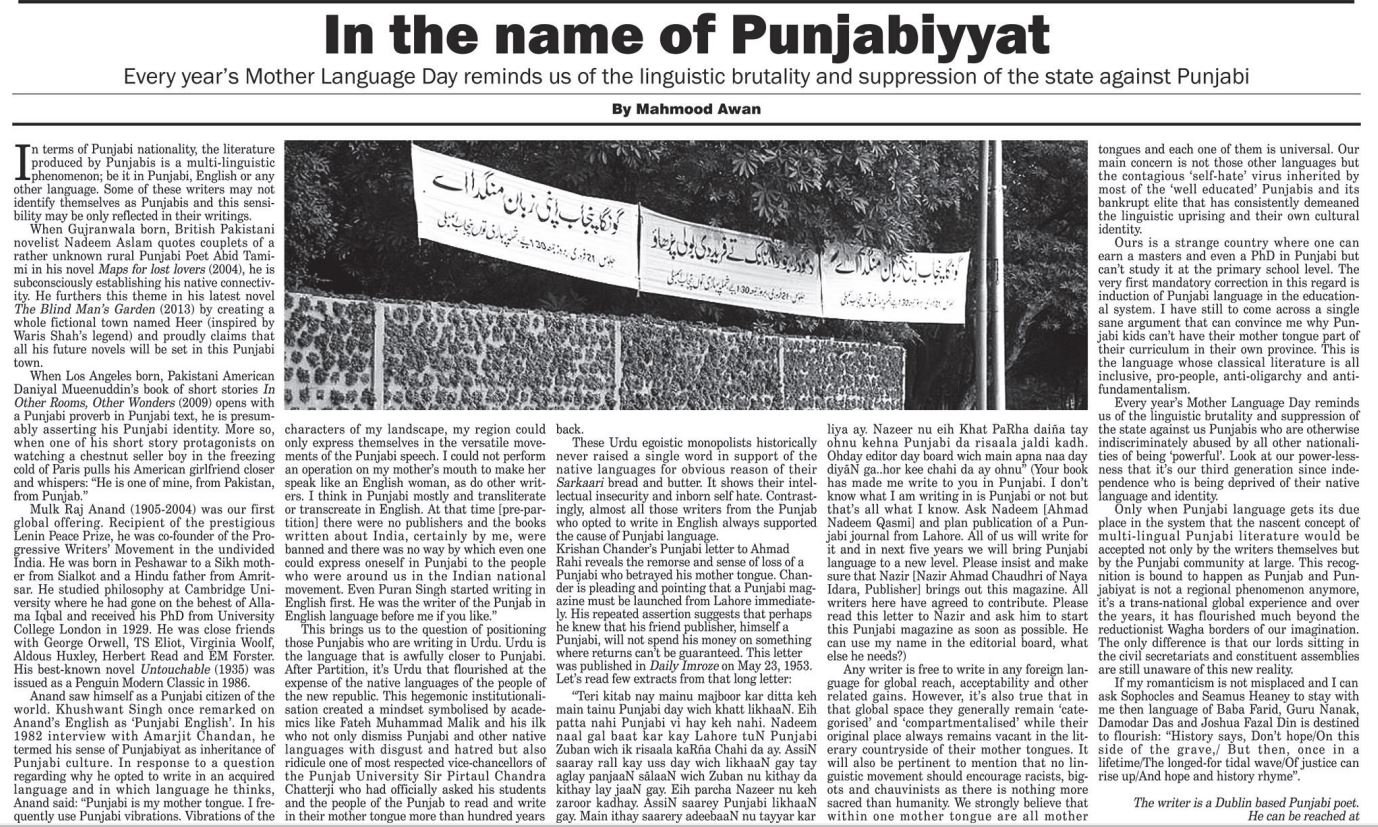Mahmood Awan (The News on Sunday, 15th February 2015)
In terms of Punjabi nationality, the literature produced by Punjabis is a multi-linguistic phenomenon; be it in Punjabi, English or any other language. Some of these writers may not identify themselves as Punjabis and this sensibility may be only reflected in their writings.
When Gujranwala born, British Pakistani novelist Nadeem Aslam quotes couplets of a rather unknown rural Punjabi Poet Abid Tamimi in his novel Maps for lost lovers (2004), he is subconsciously establishing his native connectivity. He furthers this theme in his latest novel The Blind Man’s Garden (2013) by creating a whole fictional town named Heer (inspired by Waris Shah’s legend) and proudly claims that all his future novels will be set in this Punjabi town.
When Los Angeles born, Pakistani American Daniyal Mueenuddin’s book of short stories In Other Rooms, Other Wonders (2009) opens with a Punjabi proverb in Punjabi text, he is presumably asserting his Punjabi identity. More so, when one of his short story protagonists on watching a chestnut seller boy in the freezing cold of Paris pulls his American girlfriend closer and whispers: “He is one of mine, from Pakistan, from Punjab.”
Mulk Raj Anand (1905-2004) was our first global offering. Recipient of the prestigious Lenin Peace Prize, he was co-founder of the Progressive Writers’ Movement in the undivided India. He was born in Peshawar to a Sikh mother from Sialkot and a Hindu father from Amritsar. He studied philosophy at Cambridge University where he had gone on the behest of Allama Iqbal and received his PhD from University College London in 1929. He was close friends with George Orwell, TS Eliot, Virginia Woolf, Aldous Huxley, Herbert Read and EM Forster. His best-known novel Untouchable (1935) was issued as a Penguin Modern Classic in 1986.
Anand saw himself as a Punjabi citizen of the world. Khushwant Singh once remarked on Anand’s English as ‘Punjabi English’. In his 1982 interview with Amarjit Chandan, he termed his sense of Punjabiyat as inheritance of Punjabi culture. In response to a question regarding why he opted to write in an acquired language and in which language he thinks, Anand said: “Punjabi is my mother tongue. I frequently use Punjabi vibrations. Vibrations of the characters of my landscape, my region could only express themselves in the versatile movements of the Punjabi speech. I could not perform an operation on my mother’s mouth to make her speak like an English woman, as do other writers. I think in Punjabi mostly and transliterate or transcreate in English. At that time [pre-partition] there were no publishers and the books written about India, certainly by me, were banned and there was no way by which even one could express oneself in Punjabi to the people who were around us in the Indian national movement. Even Puran Singh started writing in English first. He was the writer of the Punjab in English language before me if you like.”
This brings us to the question of positioning those Punjabis who are writing in Urdu. Urdu is the language that is awfully closer to Punjabi. After Partition, it’s Urdu that flourished at the expense of the native languages of the people of the new republic. This hegemonic institutionalisation created a mindset symbolised by academics like Fateh Muhammad Malik and his ilk who not only dismiss Punjabi and other native languages with disgust and hatred but also ridicule one of most respected vice-chancellors of the Punjab University Sir Pirtaul Chandra Chatterji who had officially asked his students and the people of the Punjab to read and write in their mother tongue more than hundred years back.
These Urdu egoistic monopolists historically never raised a single word in support of the native languages for obvious reason of their Sarkaari bread and butter. It shows their intellectual insecurity and inborn self hate. Contrastingly, almost all those writers from the Punjab who opted to write in English always supported the cause of Punjabi language.
Krishan Chander’s Punjabi letter to Ahmad Rahi reveals the remorse and sense of loss of a Punjabi who betrayed his mother tongue. Chander is pleading and pointing that a Punjabi magazine must be launched from Lahore immediately. His repeated assertion suggests that perhaps he knew that his friend publisher, himself a Punjabi, will not spend his money on something where returns can’t be guaranteed. This letter was published in Daily Imroze on May 23, 1953. Let’s read few extracts from that long letter:
“Teri kitab nay mainu majboor kar ditta keh main tainu Punjabi day wich khatt likhaaN. Eih patta nahi Punjabi vi hay keh nahi. Nadeem naal gal baat kar kay Lahore tuN Punjabi Zuban wich ik risaala kaRña Chahi da ay. AssiN saaray rall kay uss day wich likhaaN gay tay aglay panjaaN sãlaaN wich Zuban nu kithay da kithay lay jaaN gay. Eih parcha Nazeer nu keh zaroor kadhay. AssiN saarey Punjabi likhaaN gay. Main ithay saarery adeebaaN nu tayyar kar liya ay. Nazeer nu eih Khat PaRha daiña tay ohnu kehna Punjabi da risaala jaldi kadh. Ohday editor day board wich main apna naa day diyãN ga..hor kee chahi da ay ohnu” (Your book has made me write to you in Punjabi. I don’t know what I am writing in is Punjabi or not but that’s all what I know. Ask Nadeem [Ahmad Nadeem Qasmi] and plan publication of a Punjabi journal from Lahore. All of us will write for it and in next five years we will bring Punjabi language to a new level. Please insist and make sure that Nazir [Nazir Ahmad Chaudhri of Naya Idara, Publisher] brings out this magazine. All writers here have agreed to contribute. Please read this letter to Nazir and ask him to start this Punjabi magazine as soon as possible. He can use my name in the editorial board, what else he needs?)
Any writer is free to write in any foreign language for global reach, acceptability and other related gains. However, it’s also true that in that global space they generally remain ‘categorised’ and ‘compartmentalised’ while their original place always remains vacant in the literary countryside of their mother tongues. It will also be pertinent to mention that no linguistic movement should encourage racists, bigots and chauvinists as there is nothing more sacred than humanity. We strongly believe that within one mother tongue are all mother tongues and each one of them is universal. Our main concern is not those other languages but the contagious ‘self-hate’ virus inherited by most of the ‘well educated’ Punjabis and its bankrupt elite that has consistently demeaned the linguistic uprising and their own cultural identity.
Ours is a strange country where one can earn a masters and even a PhD in Punjabi but can’t study it at the primary school level. The very first mandatory correction in this regard is induction of Punjabi language in the educational system. I have still to come across a single sane argument that can convince me why Punjabi kids can’t have their mother tongue part of their curriculum in their own province. This is the language whose classical literature is all inclusive, pro-people, anti-oligarchy and anti-fundamentalism.
Every year’s Mother Language Day reminds us of the linguistic brutality and suppression of the state against us Punjabis who are otherwise indiscriminately abused by all other nationalities of being ‘powerful’. Look at our power-less-ness that it’s our third generation since independence who is being deprived of their native language and identity.
Only when Punjabi language gets its due place in the system that the nascent concept of multi-lingual Punjabi literature would be accepted not only by the writers themselves but by the Punjabi community at large. This recognition is bound to happen as Punjab and Punjabiyat is not a regional phenomenon anymore, it’s a trans-national global experience and over the years, it has flourished much beyond the reductionist Wagha borders of our imagination. The only difference is that our lords sitting in the civil secretariats and constituent assemblies are still unaware of this new reality.
If my romanticism is not misplaced and I can ask Sophocles and Seamus Heaney to stay with me then language of Baba Farid, Guru Nanak, Damodar Das and Joshua Fazal Din is destined to flourish: “History says, Don’t hope/On this side of the grave,/ But then, once in a lifetime/The longed-for tidal wave/Of justice can rise up/And hope and history rhyme”.
Published on 15th February 2015 in The News on Sunday.
https://www.thenews.com.pk/tns/detail/558049-in-the-name-of-punjabiyyat


